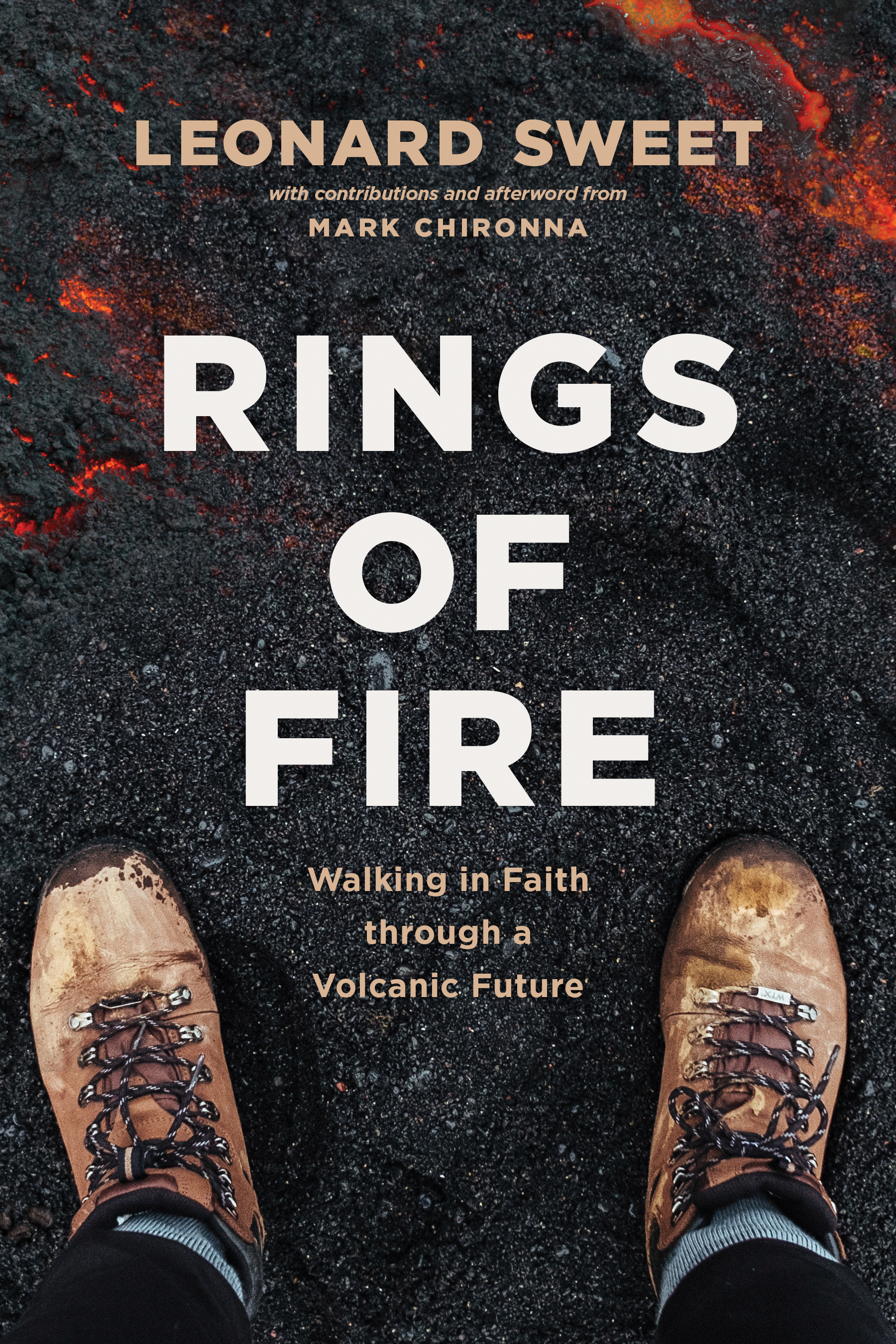The early church passed on the names of the martyrs and spoke them out loud as part of the Cloud. The world needs to hear these names, famous or not. They deserve it. We deserve it. The air deserves it—not just to clear the air but to clean the air.
by Leonard Sweet, author of Rings of Fire: Walking in Faith through a Volcanic Future
I created every one of you with a burden of sin—guilty from the moment of birth. Then I loved you so much that I made a woman pregnant so she would give birth to me and I would become my own son so that I can have myself killed as a sacrifice to myself in order to save you evil sinners from the burden of sin that I created you with in the first place.
— Salafist tract handed out by Sunni Islam evangelists in 2018 on the streets of Birmingham, England, summarizing Christian theology
The editors of GQ magazine selected some of their favorite writers to challenge “received wisdom” about classic pieces of literature. The panel was instructed to select twenty-one books they believed were overrated and could be struck “from the canon.” Number twelve on the list of “21 Books You Don’t Have to Read” is the Bible.
The GQ editors chose to ban the Bible from any required reading lists because “it is repetitive, self-contradictory, sententious, foolish, and even at times ill-intentioned.” In the Bible’s place the recommended reading is Ágota Kristóf’s novel about a world without empathy, The Notebook (1986).
Welcome to our (new) world, church. It’s a world we helped create. We asked for it.
The volcanic twenty-first century will call for the most creative evangelism and shrewd apologetics the church has seen since the first century. If ever the time is ripe for tilling, planting, and watering the soil, it is now. But best not to underestimate the challenge. We may be the least “formed” and worst prepared generation of Jesus disciples in history facing the greatest challenges the church has ever faced.
The life of Christian faith is now lived in an unfriendly environment. But “unfriendly” means different things in different times. For example, parochial schools and private Christian schools are under attack in Great Britain for promoting inequality by their existence. It is not uncommon now for weddings to be officiated by someone with no more than a notary public authority. But this is low-level “unfriendly.” Christians in the West have no idea what it means to suffer for one’s beliefs.
We will. Soon.
“Whom You . . . Denied before the Face of Pilate”
It is not easy to face or outface the “face of Pilate.” Never has been. How many times have we shrunk back in fear, even repudiated our faith under the pressure of power and the peril of authority. “The face of Pilate” can be religious authority, political authority, or pop culture. But Jesus as Lord often takes a pass, a back seat, or even a sycophant sit-down when faced with the powers of the state.
Not until the fourth century did the early church talk about the “cross” so much. Prior to then, this symbol of torture and death was a daily reality for them. The first Christians loved the symbol of the fish (ichthus in Greek, its letters standing for “Jesus Christ Son of God Savior”) and clung close to cheerful, culinary images of Jesus partly because persecution had made life so difficult. Followers of Jesus today don’t seek out crosses to carry, but when you cross the grain of culture and church, you get splinters and splintered, which become our “thorns in the flesh,” and even sometimes, if they become cross-spangled banners, our “crosses to bear.”
__________
Paper cannot wrap up a fire.
— Chinese proverb on how truth will always Win out
__________
Most recent estimates are that one in ten Christians worldwide (200 million+ brothers and sisters) are being persecuted or discriminated against. Between February 12 and 15, 2015, the Islamic State of Iraq and the Levant (ISIL) beheaded twenty-one “people of the cross,” Egyptian Coptic Christians kidnapped in the city of Sirte, Libya. They were slaughtered on the beach opposite Al Mahary Hotel in Sirte. Their last words, spoken by each as their heads were cut off, was “Lord Jesus Christ.”
Do we know any of the names, even one, of the Coptic Christian martyrs? The early church passed on the names of the martyrs and spoke them out loud as part of the Cloud. The world needs to hear these names, famous or not. They deserve it. We deserve it. The air deserves it—not just to clear the air but to clean the air.
Words like Asia Bibi are air cleaners for every household. Asia Bibi is the name of a Catholic woman sentenced to death under Pakistan’s blasphemy laws. At the same time, we also need to remember those of other faith traditions who have been or are being persecuted for their beliefs, such as the Syrian archaeologist and director of antiquities who was beheaded trying to protect the Palmyra museum from its destroyers. ISIL hung the body of Khaled al-Asaad from a pillar with a placard on it reading, “Director of Idolatry.” Why are we not weekly in worship lifting up prayers for “all persecuted Christians” and referencing some by name?
Some scholars have noticed the sharp contrast between the relative indifference of Christians to the fate of fellow Christians around the world and the care and concern of Muslims to the plight and predicament of fellow Muslims, as Muslims, or Jews, as Jews.
It is time for the church to toughen up in dealing with the world today. Jesus sent his earliest disciples out into a world that killed them. He sends us out to a mocking and maligning world, but most of us are still alive. In the language of Nassim Nicholas Taleb, we must learn to be an Antifragile Church that can embrace vulnerability and weakness and celebrate the positivity of stress. To be “antifragile” is to trust the order behind the chaos, to flourish from random environments rather than established settings, and not to be afraid of antifragile preaching that can take place outside the normal patterns (systems) of church. YouTube, Facebook, podcasts, and other digital formats (screens) are a few antifragile ways to preach in a hostile culture.
__________
That feeling of wanting to jump up and down is one of the ways that scientists measure joy.
— Designer Ingrid Fetell Lee
__________
“Where Joy Hides and How to Find It”
“Blessed are you when people hate you,” said Jesus, “when they exclude you and insult you and reject your name as evil, because of the Son of Man. Rejoice in that day and leap for joy, because great is your reward in heaven. For that is how their ancestors treated the prophets.” How many Christians are jumping up and down in the good times, much less in times of persecution and suffering? Maybe we do not leap and jump for joy because we’ve forgotten the reward now and the future reward? As we see in the Beatitudes, joy is one of the ways God measures faithfulness.
Different tribes engage in the practice of dog-whistling—sending out signals that only those who know the lingo and liturgy of the subculture will recognize. The twenty-first-century church has its own equivalent to this: the God-whistle. As the future unfolds, we will need to practice the God-whistle so our distinctives are clear and conformed to what God is whistling over us and for us.
__________
Tears melt God’s heart and bind his hand.
— Puritan Thomas Watson, THE BEATITUDES
__________
A medieval fable tells about a young woman who died early in life but was a troublemaker in heaven—so much that she was expelled but told that if she would return with the gift most valued by God, she would be welcomed back.
So she searched the ends of the earth for what God might value most. She brought back drops of blood from a dying patriot. She brought back some coins that a destitute widow had given the poor. She brought back a leaf from the Bible that one of the greatest preachers had used over a lifetime. She brought back some dust from the shoes of a missionary laboring on a remote island. She brought back many things such as these but was always turned away.
One day she saw a small boy playing by a fountain. A man rode up on horseback and dismounted to take a drink. The man saw the child and suddenly remembered his boyhood innocence. Then, looking in the fountain and seeing the reflection of his hardened face, he realized what he had done with his life. And tears of repentance welled up in his eyes and began to trickle down his cheeks. The young woman scooped up one of these tears in a lachrymatory and took it back to heaven . . . and was received with joy and celebration.
Repentance is a word seldom heard or used anymore. But apologize (from the weak French word apologie and the strong Greek/Latin word apologia) may begin to approach the depth of metanoia, or “repentance,” which David Bentley Hart consistently translates into English as “change of heart.”
By apologize, we mean what John the Baptist meant when he began his ministry with the words “Repent, for the kingdom of heaven is at hand.” True apology is not escapology but eschatology. This may include the traditional “apology,” as Pope Francis has demonstrated in his willingness to apologize to abuse victims.
Unfortunately, when the church doesn’t want to engage in substantive thought about something, it issues an apology. For example, in 1917, at the four hundredth anniversary celebration of the Protestant Reformation, the primary emphasis of Anglicanism was to claim that the purest heir of the Reformation (although it started in Germany) was the Church of England. In the course of my lifetime, the Church of England has lost 75 percent of its membership. The five hundredth anniversary in 2017 featured a quasi-apology from Justin Welby (archbishop of Canterbury) and John Sentamu (archbishop of York) for the hubris of the previous celebration. This kind of groveling is almost enough to give apology a bad name.
__________
Telling the truth is the only proper way of restoring dignity.
— Lithuanian poet Tomas Venclova, MAGNETIC NORTH
__________
The first work of grace is the first word of grace: Repent. Like John the Baptist, Jesus began his ministry with this word: “Repent, and believe in the gospel.” Peter based his most famous sermon around it: “Repent and be baptized.” Paul could not stop reminding the churches that God “commands all people everywhere to repent.” Martin Luther’s first of 95 Theses was the affirmation that when Jesus called on people to repent, it was a call that reached to every corner of life. Beginning in 1775, the Second Continental Congress calendarized specific “National Days of Prayer and Fasting,” which featured calls to “repentance,” a tradition that was periodically observed throughout US history and most memorably reinstituted by President Abraham Lincoln during the Civil War.
To apologize, in our sense of the word, involves a 3-m response: a metanoia (change of heart), a metamorphosis (change of behavior), and a metastasis (change of being). It is more than a time like Lent, when we confront our shortcomings and celebrate our passions; it is a daily lifestyle of conversion.
Everyone does wrong. The ultimate in doing wrong is failing to recognize you’ve done wrong and apologize for doing it.
We’ve done wrong in placidly occupying our privileged perches in Christendom.
We’ve done wrong in going down the rabbit’s hole of leadership rather than keeping our eyes on the prize of our high calling as followers of Christ Jesus.
We’ve done wrong in not trusting the Holy Spirit to speak the vernacular.
We’ve done wrong in a lack of humility for the blessings of our birth. We’ve done wrong as trustees of God’s creation. Planet Earth is headed toward environmental meltdown. God isn’t doing this.
We are.
The biblical call to repent is the call to come home, to return to where you came from, to turn from waywardness, and to hoist the heart toward paths of homecoming and hope. Augustine said he found out too late in life that God promises forgiveness to those who repent but not repentance to those who sin. Or in the words of Paul, who never abandoned apologetic preaching for kerygmatic preaching, as some suppose, “Do you despise the riches of His goodness, forbearance, and longsuffering, not knowing that the goodness of God leads you to repentance?” To believe in repentance is to believe there will be repentant murderers who will meet their victims in paradise, to believe there will be repentant slanderers who will meet those they slandered in heaven, to believe there will be repentant thieves who will meet those they’ve plundered in heaven.
__________
Even as the heart is mourning its loss, the soul is rejoicing in its find.
— Sufiaphorism
__________
William Temple, archbishop of Canterbury from 1942 to 1944, said that “to repent is to adopt God’s viewpoint in place of your own. . . . In itself, far from being sorrowful, it is the most joyful thing in the world, because when you have done it you have adopted the viewpoint of truth itself, and you are in fellowship with God.”
Has there ever been a better definition of repentance than this from C. S. Lewis?
Fallen man is not simply an imperfect creature who needs improvement: he is a rebel who must lay down his arms. Laying down your arms, surrendering, saying you are sorry, realising that you have been on the wrong track and getting ready to start life over again from the ground floor—that is the only way out of our “hole.” This process of surrender—this movement full speed astern—is what Christians call repentance. Now repentance is no fun at all. It is something much harder than merely eating humble pie. It means unlearning all the self-conceit and self-will that we have been training ourselves into for thousands of years.
When Jesus called for people to repent, he was calling them to take on the courage of a child: who is open to life, not armored in defenses and weaponized with victimology; who is receptive to risk—the risk of becoming all of who they are, which is the essence of the abundant life promised to all who grow into childhood. Unless, therefore, we become as a child and are willing to repent, we cannot be his disciples or “see” the kingdom of heaven forming all around us.
“There is hope in your future, says the Lord” is the bottom line of repentance.
For more resources on how to live out your faith in a hostile culture, check out Tyndale’s books for hope and healing in times of social unrest.
 Rings of Fire by Leonard Sweet
Rings of Fire by Leonard Sweet
What Lies Ahead for Christians around the World?
If you follow the works of bestselling authors Malcolm Gladwell, Faith Popcorn, Daniel Pink, and other trend forecasters, you’ll appreciate learning about over 25 rings of fire that lie ahead for Christians around the world.
Len Sweet once again maps the future for the church in this sweeping survey of the twenty-first century. In the face of eruptive and disruptive culture changes from economics and communications to bioethics and beyond, how do we fight fire with fire, not only catching up to our culture but leading our friends and neighbors toward the feet of Christ? No one has done more to startle the church from its slumber than Len Sweet, and no one has equipped the church as effectively. This is a benchmark book from a seminal leader of the modern evangelical movement.
Mark Chironna provides incisive questions to stimulate creative thinking for individual or group study and an afterword that ties Len’s expansive work together and sets us on the right course for decades to come.






